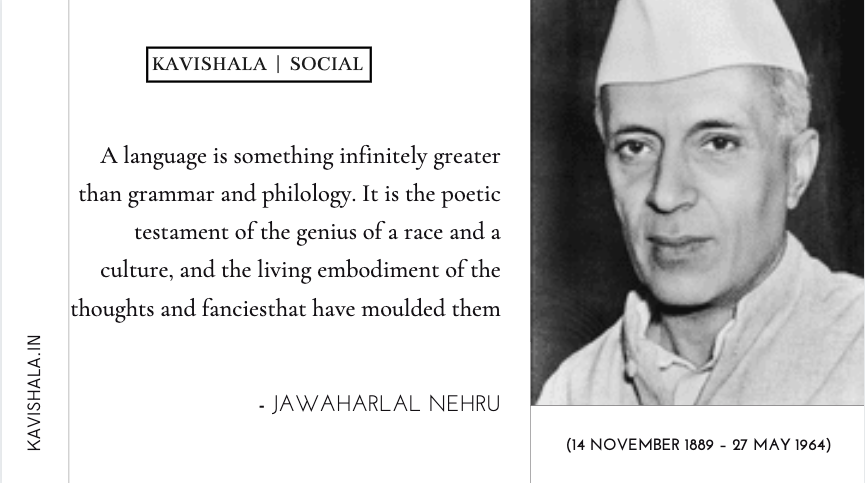
- “A language is something infinitely greater than grammar and philology. It is the poetic testament of the genius of a race and a culture, and the living embodiment of the thoughts and fancies that have moulded them”
- “India has known the innocence and insouciance of childhood, the passion and abandon of youth, and the ripe wisdom of maturity that comes from long experience of pain and pleasure; and over and over a gain she has renewed her childhood and youth and age.
- The best and noblest gifts of humanity cannot be the monopoly of a particular race or country; its scope may not be limited nor may it be regarded as the miser's hoard buried underground.
- Without that passion and urge, there is a gradual oozing out of hope and vitality, a settling down on lower levels of existence, a slow merging into non-existence. We become prisoners of the past and some part of its immobility sticks to us.
- The ideals and objectives of yesterday was still ideals of today, but they lost some of their luster and even, as one seemed to go towards them, they lost the shining beauty which had warmed the heart and vitalized the body. Evil triumphed often enough, but what was far worse was the coarsening and distortion of what seemed so right. Was human nature so essentially bad that it would take ages of training ,through suffering and misfortune, before it could behave reasonably and raise man above the creature of lust and violence and deceit that he now was? And, meanwhile , was every effort to change radically in the present or the near future doomed to failure
- No two persons could be so different from one another in their make up or temperaments. Tagore, the aristocratic artist, turned democrat with proletarian sympathies, represented essentially the cultural tradition of India, the tradition of accepting life in the fullness thereof and going through it with song and dance. Gandhi, more a man of the people, almost the embodiment of the Indian peasant, represented the other ancient tradition of India, that of renunciation and asceticism. And yet Tagore was primarily the man of thought, Gandhi of concentrated and ceaseless activity. Both, in their different ways had a world outlook, and both were at the same time wholly Indian. They seemed to present different but harmonious aspects of India and to complement one another.
- Our lives are encumbered with the dead wood of this past; all that is dead and has served its purpose has to go. But that does not mean a break with, or a forgetting of, the vital and life-giving in that past. We can never forget the ideals that have moved our race, the dreams of the Indian people through the ages, the wisdom of the ancients, the buoyant energy and love of life and nature of our forefathers, their spirit of curiosity and mental adventure, the daring of their thought, their splendid achievements in literature, art and culture, their love of truth and beauty and freedom, the basic values that they set up, their understanding of life's mysterious ways, their toleration of other ways than theirs, their capacity to absorb other peoples and their cultural accomplishments, to synthesize them and develop a varied and mixed culture; nor can we forget the myriad experiences which have built up our ancient race and lie embedded in our sub-conscious minds. We will never forget them or cease to take pride in that noble heritage of ours. If India forgets them she will no longer remain India and much that has made her our joy and pride will cease to be.
- As Schopenhauer says, ‘a man can do what he will, but not will as he will.
- The peasant starved, yet centuries of an unequal struggle against his environment had taught him to endure, and even in poverty and starvation he had a certain calm dignity, a feeling of submission to an all-powerful fate. Not so the middle classes, more especially the new petty bourgeoisie, who had no such background. Incompletely developed and frustrated, they did not know where to look, for neither the old nor the new offered them any hope. There was no adjustment to social purpose, no satisfaction of doing something worthwhile, even though suffering came in its train. Custom-ridden, they were born old, yet they were without the old culture. Modern thought attracted them, but they lacked its inner content, the modern social and scientific consciousness. Some tried to cling tenaciously to the dead forms of the past, seeking relief from present misery in them. But there could be no relief there, for, as Tagore has said, we must not nourish in our being what is dead, for the dead is death-dealing. Others made themselves pale an
Read More! Earn More! Learn More!
